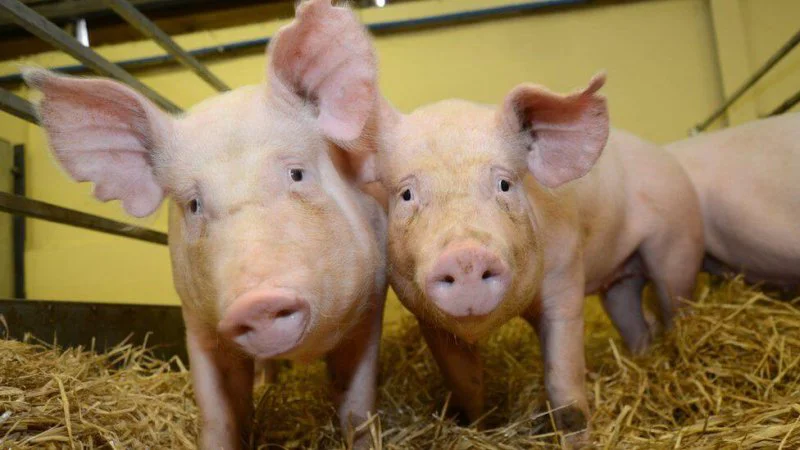CRISPR bacon: Gene editing could help supply high-quality pork and eliminate pig castration
CRISPR bacon: Gene editing could help supply high-quality pork and eliminate pig castration


It was in June 2019 that the birth of a specific batch of gene-edited piglets was announced to the world. It was a significant step in the quest to achieve commercial production of male pigs that never reach adolescence, and therefore do not need castration to prevent boar taint.
…
This particular gene edit relates to stopping expression of a gene that triggers the release of hormones necessary for sexual maturation. The gene, called KISS1, is expressed in the pig’s pituitary gland during puberty, and triggers certain cells to mature and begin producing hormones, which propel puberty forward as the animal grows older.
The genetic basis for the hormones that relate to growth and maturation in humans has already been studied extensively, notes Tad Sonstegard, who leads the piglet research and is chief executive and scientific officer at Acceligen, Recombinetics’ agriculture division.
…
To achieve commercial production of male pigs that do not reach adolescence (and therefore do not have boar taint), male pigs obviously need to receive the gene edit from their parents. However, because the parent nucleus stock would also have this gene edit and therefore would stay preadolescent themselves, an effective and efficient way must be found to make both male and female parent stock fertile.
The strategy that will be used here involves supplying an analog of KISS1 to the pigs.
Read the original post

 | Videos | More... |

Video: Nuclear energy will destroy us? Global warming is an existential threat? Chemicals are massacring bees? Donate to the Green Industrial Complex!
 | Bees & Pollinators | More... |

GLP podcast: Science journalism is a mess. Here’s how to fix it

Mosquito massacre: Can we safely tackle malaria with a CRISPR gene drive?

Are we facing an ‘Insect Apocalypse’ caused by ‘intensive, industrial’ farming and agricultural chemicals? The media say yes; Science says ‘no’
 | Infographics | More... |

Infographic: Global regulatory and health research agencies on whether glyphosate causes cancer
 | GMO FAQs | More... |

Why is there controversy over GMO foods but not GMO drugs?

How are GMOs labeled around the world?

How does genetic engineering differ from conventional breeding?
 | GLP Profiles | More... |

Alex Jones: Right-wing conspiracy theorist stokes fear of GMOs, pesticides to sell ‘health supplements’




 California, Washington, Oregon forge immunization alliance to safeguard vaccine access against federal undermining
California, Washington, Oregon forge immunization alliance to safeguard vaccine access against federal undermining Trust issues: What happens when therapists use ChatGPT?
Trust issues: What happens when therapists use ChatGPT? Fighting deforestation with CO2: Biotechnology breakthrough creates sustainable palm oil alternative for cosmetics
Fighting deforestation with CO2: Biotechnology breakthrough creates sustainable palm oil alternative for cosmetics Viewpoint — Fact checking MAHA mythmakers: How wellness influencers and RFK, Jr. undermine American science and health
Viewpoint — Fact checking MAHA mythmakers: How wellness influencers and RFK, Jr. undermine American science and health 30-year-old tomato line shows genetic resistance to devastating virus
30-year-old tomato line shows genetic resistance to devastating virus The free-range chicken dilemma: Better for birds, but with substantial costs
The free-range chicken dilemma: Better for birds, but with substantial costs Viewpoint: Video — Big Solar is gobbling up productive agricultural land and hurting farmers yet providing little energy or sustainabilty gains
Viewpoint: Video — Big Solar is gobbling up productive agricultural land and hurting farmers yet providing little energy or sustainabilty gains ‘You have to treat the brain first’:Rethinking chronic pain with Sanjay Gupta
‘You have to treat the brain first’:Rethinking chronic pain with Sanjay Gupta
